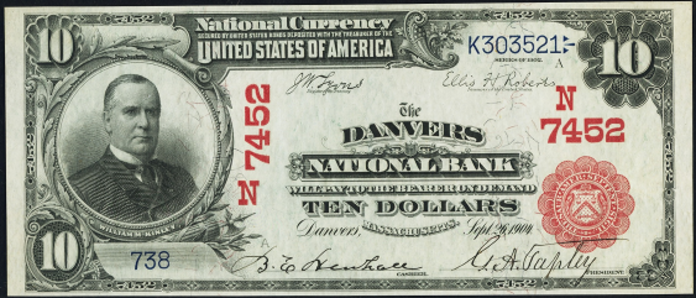Ten Dollar Notes › Nationals › 1902 Ten Dollar National Bank Notes › Rhode Island Charters › 1902 $10 Cumberland Rhode Island Cumberland National Bank
Get Value Now
| Item | Info |
|---|---|
| Series | 1902 |
| Charter | #1404 Cumberland National Bank of Cumberland, Rhode Island |
| Year Chartered | 1865, 944 Banks Chartered |
| City Info | Cumberland is the northeasternmost town in Providence County, Rhode Island, United States, first settled in 1635 and incorporated in 1746. The population was 33,506 at the 2010 census. Cumberland was originally settled as part of Wrentham, Massachusetts, which was purchased from the local Indigenous Americans by the Plymouth Colony. It was later transferred to Rhode Island as part of a long-running boundary dispute. The town was named in honor of Prince William, Duke of Cumberland. Source: Wikipedia |
| Similar Cities | If your note doesn't match try: 1. Cumberland, Maryland - First National Bank 2. Cumberland, Maryland - Second National Bank 3. Cumberland, Maryland - Third National Bank 4. Cumberland, Maryland - Citizens National Bank 5. New Cumberland, West Virginia - First National Bank 6. New Cumberland, Pennsylvania - New Cumberland National Bank 7. Cumberland, Ohio - First National Bank |
| Seal Varieties | Red, Blue |
| See Also | If your note doesn't match try: 1. 1907 $10 Gold Certificate 2. 1901 $10 Legal Tender 3. 1908 $10 Silver Certificates |
| Other Info | 1. Value depends on notes known for charter, condition and market demand. |
| Neat Fact | Plain Backs issued in sheets of 4 Notes: 3 $10 Notes, 1 $20 Note. Less commonly 4 $20 Notes (Friedbergs, 20th Ed. P131) |
No Obligations Offers and Appraisals
Please submit a good photo or scan. It will be identified and evaluated. Understand there may be subtle differences between the image you see above and your note. Signatures, design, markings and note condition will determine the offer price. Notes in Uncirculated or better condition receive the best offers.
Appraisals can be estimated for wholesale and retail prices. Wholesale is what dealers typically pay. Retail is what a collector might pay. Retail is slightly higher in most cases.
Please visit this page for USA Paper Money Reference. Do not treat this page as a reference guide, it is for appraisal and acquisition purposes only.
